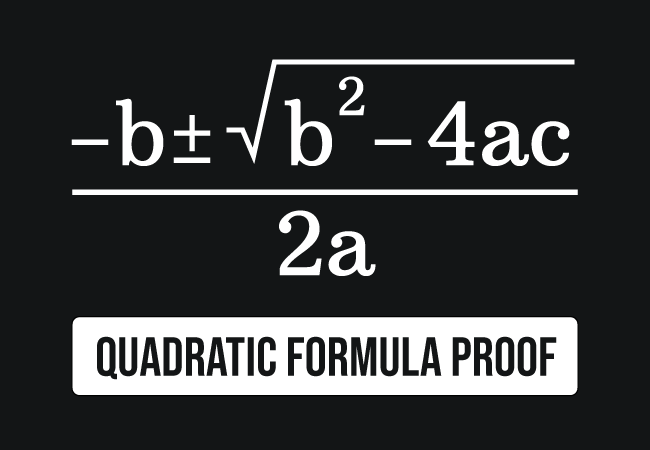
$ax^2+bx+c = 0$ is a standard algebraic form of a quadratic equation in mathematics and the solution of this general form equation is expressed by the following quadratic formula.
$x \,=\, \dfrac{-b \pm \sqrt{b^2-4ac}}{2a}$
Now, let’s learn how to derive the quadratic formula fundamentally in mathematics. It is actually proved by completing the square method.
The term $c$ represents the constant. Now, move the constant $c$ to the right side of the equation.
$\implies$ $ax^2+bx \,=\, -c$
For converting the left side expression of the equation into square form of a binomial completely, eliminate the coefficient of $x^2$ from the first term. So, divide both sides of the equation by $a$.
$\implies$ $\dfrac{ax^2+bx}{a}$ $\,=\,$ $-\dfrac{c}{a}$
$\implies$ $\dfrac{ax^2}{a}+\dfrac{bx}{a}$ $\,=\,$ $-\dfrac{c}{a}$
$\implies$ $\bigg(\dfrac{a}{a}\bigg)x^2+\bigg(\dfrac{b}{a}\bigg)x$ $\,=\,$ $-\dfrac{c}{a}$
$\implies$ $\bigg(\dfrac{\cancel{a}}{\cancel{a}}\bigg)x^2+\bigg(\dfrac{b}{a}\bigg)x$ $\,=\,$ $-\dfrac{c}{a}$
$\implies$ $x^2+\bigg(\dfrac{b}{a}\bigg)x$ $\,=\,$ $-\dfrac{c}{a}$
Now, the left hand side expression of the equation should be transformed into complete square form. It can be obtained by adjusting the second term slightly for our convenience.
$\implies$ $x^2+1 \times \bigg(\dfrac{b}{a}\bigg)x$ $\,=\,$ $-\dfrac{c}{a}$
The multiplying factor $1$ can be written as the quotient of $2$ by $2$ because the division of $2$ by $2$ is $1$.
$\implies$ $x^2+\bigg(\dfrac{2}{2}\bigg) \times \bigg(\dfrac{b}{a}\bigg)x$ $\,=\,$ $-\dfrac{c}{a}$
$\implies$ $x^2$ $+$ $2 \times \dfrac{1}{2} \times \bigg(\dfrac{b}{a}\bigg)x$ $\,=\,$ $-\dfrac{c}{a}$
$\implies$ $x^2$ $+$ $2 \times \bigg(\dfrac{b}{2a}\bigg)x$ $\,=\,$ $-\dfrac{c}{a}$
$\implies$ $x^2$ $+$ $2 \times \bigg(\dfrac{b}{2a}\bigg) \times x$ $\,=\,$ $-\dfrac{c}{a}$
$\implies$ $x^2$ $+$ $2 \times x \times \bigg(\dfrac{b}{2a}\bigg)$ $\,=\,$ $-\dfrac{c}{a}$
$\implies$ $x^2$ $+$ $2x\bigg(\dfrac{b}{2a}\bigg)$ $\,=\,$ $-\dfrac{c}{a}$
There is a chance to transform the left hand side expression as a square of sum of two terms but the expression should contain a term $\bigg(\dfrac{b}{2a}\bigg)^2$. Thereore, add $\bigg(\dfrac{b}{2a}\bigg)^2$ to the expression and also subtract it from the same expression.
$\implies$ $x^2$ $+$ $2x\bigg(\dfrac{b}{2a}\bigg)$ $+$ $\bigg(\dfrac{b}{2a}\bigg)^2$ $-$ $\bigg(\dfrac{b}{2a}\bigg)^2$ $\,=\,$ $-\dfrac{c}{a}$
Now, move the negative constant quantity to the right hand side expression of the equation.
$\implies$ $x^2$ $+$ $2x\bigg(\dfrac{b}{2a}\bigg)$ $+$ $\bigg(\dfrac{b}{2a}\bigg)^2$ $\,=\,$ $\bigg(\dfrac{b}{2a}\bigg)^2$ $-$ $\dfrac{c}{a}$
The left hand side expression of the equation represents the expansion of the square of sum of two terms formula. So, it can be converted to a square of a binomial completely by this rule.
$\implies$ $\bigg(x+\dfrac{b}{2a}\bigg)^2$ $\,=\,$ $\bigg(\dfrac{b}{2a}\bigg)^2$ $-$ $\dfrac{c}{a}$
The simplification process can be started by simplifying the right hand side expression of the equation. The first term can be simplified by the power of a quotient rule.
$\implies$ $\bigg(x+\dfrac{b}{2a}\bigg)^2$ $\,=\,$ $\dfrac{b^2}{(2a)^2}$ $-$ $\dfrac{c}{a}$
$\implies$ $\bigg(x+\dfrac{b}{2a}\bigg)^2$ $\,=\,$ $\dfrac{b^2}{4a^2}$ $-$ $\dfrac{c}{a}$
Now, use the subtraction of the fractions to find the difference of them mathematically.
$\implies$ $\bigg(x+\dfrac{b}{2a}\bigg)^2$ $\,=\,$ $\dfrac{b^2-4ac}{4a^2}$
Take square root to both sides of the equation for eliminating the square of the left hand side expression in the above equation.
$\implies$ $x+\dfrac{b}{2a}$ $\,=\,$ $\pm \sqrt{\dfrac{b^2-4ac}{4a^2}}$
$\implies$ $x+\dfrac{b}{2a}$ $\,=\,$ $\pm \sqrt{\dfrac{b^2-4ac}{{(2a)}^2}}$
$\implies$ $x+\dfrac{b}{2a}$ $\,=\,$ $\pm \dfrac{\sqrt{b^2-4ac}}{2a}$
$\implies$ $x \,=\, -\dfrac{b}{2a} \pm \dfrac{\sqrt{b^2-4ac}}{2a}$
$\,\,\, \therefore \,\,\,\,\,\, x \,=\, \dfrac{-b \pm \sqrt{b^2-4ac}}{2a}$
In this way, the quadratic formula is derived mathematically by completing the square method in mathematics.
A free math education service for students to learn every math concept easily, for teachers to teach mathematics understandably and for mathematicians to share their maths researching projects.
Copyright © 2012 - 2023 Math Doubts, All Rights Reserved